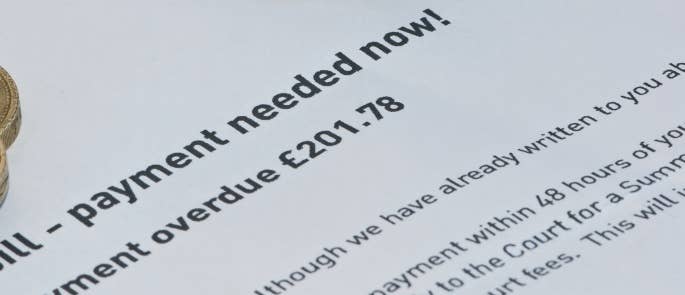How Can I Offer Credit to My Customers?
At some point, most business will want to offer their goods and services on credit. If done right, offering credit is a smart way to boost sales, as more customers will be able to purchase your items or services in a way that fits their budget. However, offering credit does comes with risks. Many companies who provide credit will have experienced being paid late or not at all at some point during their trading history.
Therefore, offering credit to customers requires a robust credit control procedure if you want to actually receive payment and maintain a positive cash flow. You also need to ensure you meet certain legal requirements and know how the law can help you. By taking the necessary steps, you can provide credit to customers and reduce the risks to your business.
Need a Course?
Our Credit Control Training Course teaches effective chase techniques, how to tackle common excuses for non-payment, and how third parties and the court can help you reclaim debts. With this knowledge, you’ll be able to offer credit to customers with as low a risk as possible and chase overdue payments effectively.
Do I Need a Consumer Credit Licence? (& Other FAQs)
To offer credit to customers, you will likely need to acquire consumer credit authorisation from the Financial Conduct Authority (FCA). You need to do so even if you had a licence in the past. However, you do not need it if you only offer credit to limited companies. Consumer credit authorisation was previously known as a consumer credit licence when the Office of Fair Trading (OFT) regulated credit, but the Financial Conduct Authority renamed it when they assumed control.

You will need consumer credit authorisation for the following activities:
- Selling goods or services on finance (this includes hire purchases).
- Lending money.
- Credit broking.
- Hiring or leasing out goods for over 3 months.
- Arranging credit for other people.
- Issuing credit cards to people.
- Collecting or purchasing consumer credit debts.
- Assisting people with their debt problems or offering them advice on their credit standing.
This list is not exhaustive, as the Financial Conduct Authority’s definition of businesses that may or may not need authorisation is broad. However, generally speaking, any business that provides goods and services on finance to customers and unincorporated associations needs to have authorisation.
What if I have a consumer credit licence from OFT?
Consumer credit licences are no longer sufficient authorisation. If you registered for interim permission from the OFT before the change, you are permitted to continue carrying out credit activities while you wait for full authorisation from the FCA. However, you must apply for authorisation as soon as possible. This is necessary to become properly authorised and added to the FCA’s list of registered businesses.
How do I apply for consumer credit authorisation?
The Financial Conduct Authority provides a 9-step checklist you should follow before applying for authorisation:
- Have your National Insurance or passport number to hand.
- Prepare relevant business documents, including draft agreements, pre-contract information, promotional literature, and website screenshots.
- Calculate the highest projected amount of client money (where relevant to your firm) and consumer credit income for the next 12 months.
- Determine what regulated financial activities you plan to carry out.
- Have your employment history for the past 5 years to hand. You should also have your residential addresses from the past 3 years and details of significant events for each approved person.
- Prepare details of partners, shares, subordinated loans, and other external funding where relevant.
- Establish the firm’s approved person(s) and money laundering reporting officer, where relevant. Be ready to describe how your firm will manage risks from money laundering.
- Have your business plan to hand.
- Complete the IT self-assessment questionnaire, which you can find on the Financial Conduct Authority’s website.

You will then need to register with their Connect service to make an application.
Are there any limits or exemptions relating to authorisation?
You do not need authorisation if the only credit-related activity you carry out is taking credit card payments. However, you will need authorisation if you issue credit cards.
You are also exempt from authorisation if you only offer certain types of instalment credit agreements. This includes those that are repayable by fewer than 12 instalments within 12 months, that finance specific goods or services, and are for a fixed amount of money. It is not exempt if it involves interest charges, conditional sales or HP agreements, pawn agreements, or buying land.
It is also worth noting that the Consumer Credit Act 2006, which expanded on the Consumer Credit Act 1974, removed the £25,000 financial limit for the regulation of consumer credit and consumer hire agreements. This means that all consumer credit agreements can be subject to regulation.
However, agreements exceeding £25,000 will not be subject to regulation where ‘the agreement is entered into by the borrower wholly or predominantly for the purposes of a business carried on, or intended to be carried on, by the borrower.’ (Quote extracted from FCA handbook.)
If you’re still unsure whether you need authorisation, contact the Financial Conduct Authority. You should describe to them the type of credit-related activities you plan to carry out so the FCA can properly advise you.
Implementing Good Credit Control Procedures
If your business offers credit, you must have strong control procedures in place. Otherwise, you’ll likely face customers who pay late or regularly encounter ‘problems’ that endlessly delay their payment. Proper procedures ensure that you do business with customers who are more likely to pay in the first place, and that you have a working chase system for when they don’t.

Effective credit control is crucial because unpaid credit will rapidly lead to a backlog of bad debts. This in turn impacts your cash flow. Studies show time and time again that poor cash flow is one of the most common reasons businesses fail, so you’re entering dangerous territory if you offer credit unprepared.
To implement good credit control procedures, you should do the following:
Establish payment terms early on
Providing credit is a contractual agreement that needs clear-cut terms and conditions in order for you to retain control. As a credit provider, it’s your job to establish the terms your customers must agree to upfront. This means that, if they try to avoid paying, you can use your agreement to apply pressure and involve the law if necessary.
Check your customers
The more customers you offer credit to, the higher chance there is of finding people who won’t or can’t pay. Therefore, you need to carry out proper checks on every potential customer to identify their creditworthiness. You can do this through credit checking companies and/or through references they provide in their application for credit. Doing so could help you avoid a massive headache in the future.
Don’t buy excuses
Although many customers that you encounter will be perfectly trustworthy, plenty of people simply want to get out of paying. Whether this is because they’re a penny pincher or are hundreds of thousands of pounds in debt, they are armed with every excuse in the book and are bad for business. You should therefore immediately apply pressure to anyone who starts piling on excuses or unfulfilled promises.

Consider insurance
Despite your best efforts, unpaid accounts do happen. To minimise the amount that you write off, consider acquiring credit insurance to reclaim a percentage of bad debts. It may not be viable if your business is small, but it’s certainly worth thinking about if the number of your customers who use credit is rapidly increasing.
Know your rights
The Late Payment of Commercial Debts (Interest) Act 1998 and the Late Payment of Commercial Debts Regulations 2002 exist to give businesses the legal right to apply 8% interest and other costs on late payments. You should state this in your terms of payment and use it on customers who clearly don’t want to cooperate. Furthermore, you can take issues to solicitors and the court if need be.
Create a solid chase cycle
The process you follow when chasing late payments can make or break how rapidly you reclaim it. You must know exactly what to say, how frequently to chase, and what methods to use. Proper credit controlling ensures you remain in control and apply an effective amount of pressure. This will prevent debtors from walking over you or becoming annoyed and less likely to cooperate.
While offering credit is a powerful way to attract new customers and increase profits, you need to jump through all the legal hoops and establish proper processes to do so successfully. Make sure you familiarise yourself with each of these steps, including a professional credit control method, so you can get started with a strong foothold.
What to Read Next:
- Credit Control Training Course
- Definitive Guide to Sole Trader Tax
- How to Write a Business Plan for Your Cleaning Company





